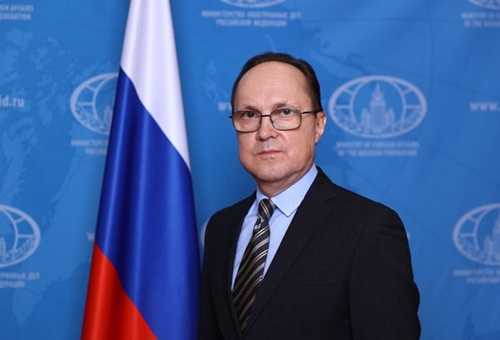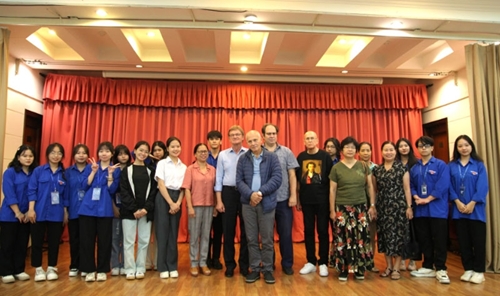Cultural connections to deepen friendship
Reporter: Could you tell us about the role and significance of arts and literature in the friendship between our two nations?
Ambassador G. S. Bezdetko: Arts and literature serve as a profound bridge that connects different cultures, customs, languages, and peoples, ultimately strengthening closer friendship. Through outstanding works, we have the opportunity to engage with authors from different eras and nations.
In Vietnam, the appeal of the Russian literature, including classical, modern, and even ancient works, endures, captivating readers of various ages and professions. This demonstrates the intimacy, mutual understanding, and strong friendship between our peoples.
    |
 |
|
Mr. Gennady Stepanovich Bezdetko, Ambassador Extraordinary and Plenipotentiary of the Russian Federation to Vietnam |
The Russian literature has been translated into Vietnamese, dating back to the previous century. Not only the timeless classics like those of A. Pushkin, F. Dostoevsky, L. Tolstoy, M. Lermontov, A. Blok, I. Bunin, but also modern works with a social realistic perspective, such as "How the steel was tempered" by N. Ostrovsky and "Live and remember" by V. Rasputin, have been well-known in Vietnam due to the relatability of their narratives.
Other art forms, such as music (compositions by A. Pakhmutova and M. Tariverdiev) and cinema (classics like "The cranes are flying" and "Seventeen moments of Spring," and "Moscow does not believe in tears"), have etched themselves into the collective memory of the Vietnamese public. These works are regularly performed on stages, media, and social platforms.
The Vietnamese literary works by renowned authors like Ngo Tat To, Nguyen Cong Hoan, Nguyen Tuan, and Nam Cao, which were written before the August Revolution in 1945 and in the first decade after the national independence, were translated and published in the former Soviet Union. In the 1980s, collections of fairy tales of ethnic groups in Vietnam were published in the Russian language. Although not reprinted since, every Vietnamese scholar carefully preserves these books in their personal collections. Other artistic fields in Vietnam are also known in the Russian Federation through friendly exchanges.
Reporter: Over 30 years have passed since the dissolution of the Soviet Union, and literary and artistic cooperation, in particular, no longer holds the same prominence as before. What do you see as the subjective and objective reasons for this decline?
Ambassador G. S. Bezdetko: I just partly agree with that assessment. It is true that there has been a decline in the taste for classic literary works. Much of this is due to contemporary trends: the consumer culture is thriving, rapid developments in modern technology, and the widespread use of "clip thinking" have significantly reduced the number of readers willing to engage with the classic literature that demands intellectual effort. This is a global issue, not specific to the Russian literature.
Despite this decline, our two nations are still successfully implementing various collaborative projects. For over a decade, the best translators from the two sides have worked on a book translation project supported by Russia’s VTB Bank to publish classic and modern literary works from both countries, with a total of 40 books printed and distributed in both Vietnamese and Russian. This project is essentially a charitable endeavor. Once published, the books are provided free of charge to schools and universities in Vietnam that teach the Russian language.
The Russian Science and Culture Center in Vietnam regularly organizes events to introduce Russian culture to the Vietnamese public. For instance, this year, the center conducted a series of lectures, festivals, and exhibitions to commemorate the 100th birthday of Poet R. Gamzatov.
Reporter: Some admirers of Russia argue that the promotion of the Russian literature and art in Vietnam has not been commensurate with the greatness of the Russian literary and artistic heritage, having yet to meet the needs of young Vietnamese audiences. What are your thoughts on this?
Ambassador G. S. Bezdetko: The interest of the younger generation is a priceless resource that needs to be maximized. It helps us bridge all gaps and fosters a deeper connection between our peoples. A recent example is the visit of a group of renowned contemporary Russian writers to Vietnam, organized by the Institute of Translation with support from Rossotrudnichestvo, the Federal Agency for the Commonwealth of Independent States, Compatriots Living Abroad, and International Humanitarian Cooperation (Rossotrudnichestvo).
    |
 |
|
Russian writers and Vietnamese readers on the sidelines of the 8th Hanoi Book Festival in October, 2023 |
Among the delegation members were world-famous writers like E. Vodolazkin, author of the bestseller "Laurus"; M. Zamshev, Editor-in-Chief of the Literary Gazette; Poet E. Chigrin; Poet, writer and translator A. Strokina; and historian and culturalist A. Esparza. They had a busy program featuring lectures, literary meetings, and friendly discussions. The delegation brought an extensive collection of Russian books, displayed at a special booth by Hoan Kiem Lake, drawing significant interest of the audience of the city. The booth was visited by Vietnamese Deputy Prime Ministers Tran Hong Ha and Tran Luu Quang, among other distinguished guests.
I understand that it can be challenging at times to attract young people to classical works. However, I believe that modern works can serve as a creative bridge between our two nations.
Enhancing literary and artistic cooperation
Reporter: Currently, many Vietnamese individuals and organizations, because of their love for the former Soviet Union and the contemporary Russia Federation, voluntarily promote and introduce the Russian literature and art to the Vietnamese public. Since these efforts are often in a small scale, they encounter various difficulties. Does the Russian Federation have any intentions of cooperating and providing support?
Ambassador G. S. Bezdetko: Fortunately, many people in Vietnam have made invaluable contribution to the promotion of the Russian culture. Firstly, I want to highlight the following outstanding translators, who are our close friends. Translator Hoang Thuy Toan initiated the literary translation project I mentioned earlier. Another significant figure is the distinguished Translator and Lecturer Vu The Khoi, a master of Russian literary translation widely recognized in Vietnam. Translator Le Duc Man is also a Russian language and culture expert. His recent achievements include translating the famous works "Anna Karenina" by L. Tolstoy and "Oblomov" by I. Goncharov. Both books are being prepared for publication in Russia as part of the aforementioned project. Translator Nguyen Thuy Anh, an outstanding Russian language expert, has devoted much of her time to "Reading Books with Children," a club that promotes reading for children, including Russian literary works. She is currently responsible for the project to compile Russian-language textbooks for Vietnamese primary school students, published by the Prosveshchenie Publishing House.
On our part, we deeply appreciate the dedication of our Vietnamese friends in various literary and artistic fields and are ready to support them and other passionate individuals in any way possible.
Reporter: In the spirit of cooperative friendship, it is important to maintain a balance. Apart from translating Vietnamese literary works and publishing them in Russia or training Vietnamese students in Russian educational institutions, do you think there may be future collaborative potential for this area?
Ambassador G. S. Bezdetko: I believe that the training of professionals who are genuinely interested in deeper collaboration with Vietnam will be the cornerstone of further development in our relationship in any fields. It is noteworthy that in recent years, the number of Vietnamese students in Russia, especially in the field of arts, has significantly increased.
I want to emphasize that the Vietnamese literature and art are also cherished by the Russian people, who have no connection to Vietnam. A few years ago, two prominent translations of classic Vietnamese masterpiece “Truyen Kieu” (The tale of Kieu) were published in Russia. One of these translations, done by Translator Vu The Khoi in the form of free verses with detailed historical and cultural annotations, has garnered considerable interest among Russian readers. In Russian bookstores, you can also find the first translation of a Vietnamese play, "The Cup of Poison," by playwright Vu Dinh Long.
Certainly, all these facts affirm that for effectiveness, certain material conditions are needed, which can be provided through grants and scholarships. I believe that both State budgets and private sector resources can serve as sponsors for the field.
Reporter: Thank you so much, Ambassador!
Translated by Trung Thanh